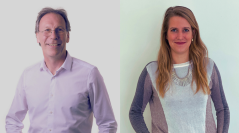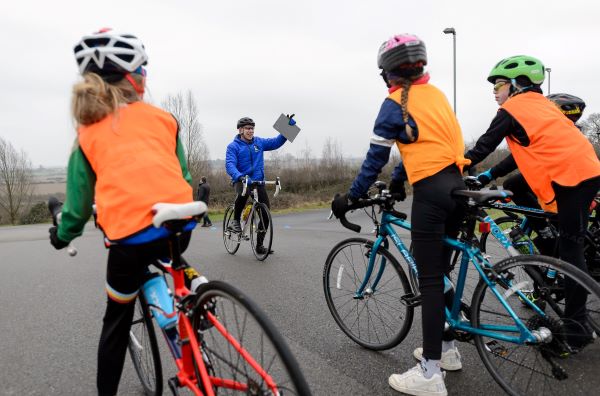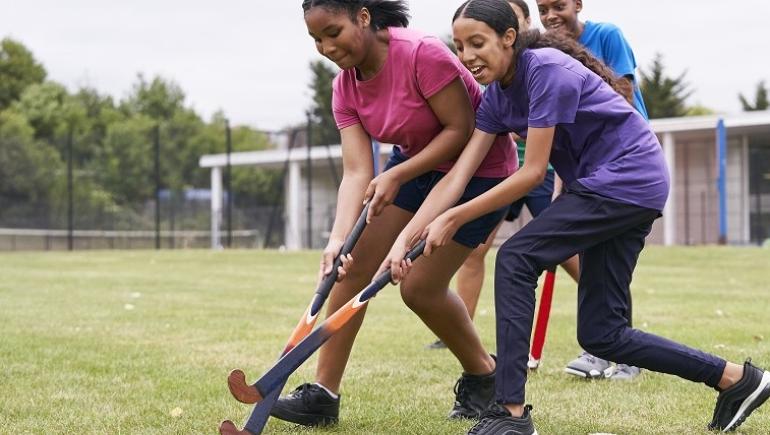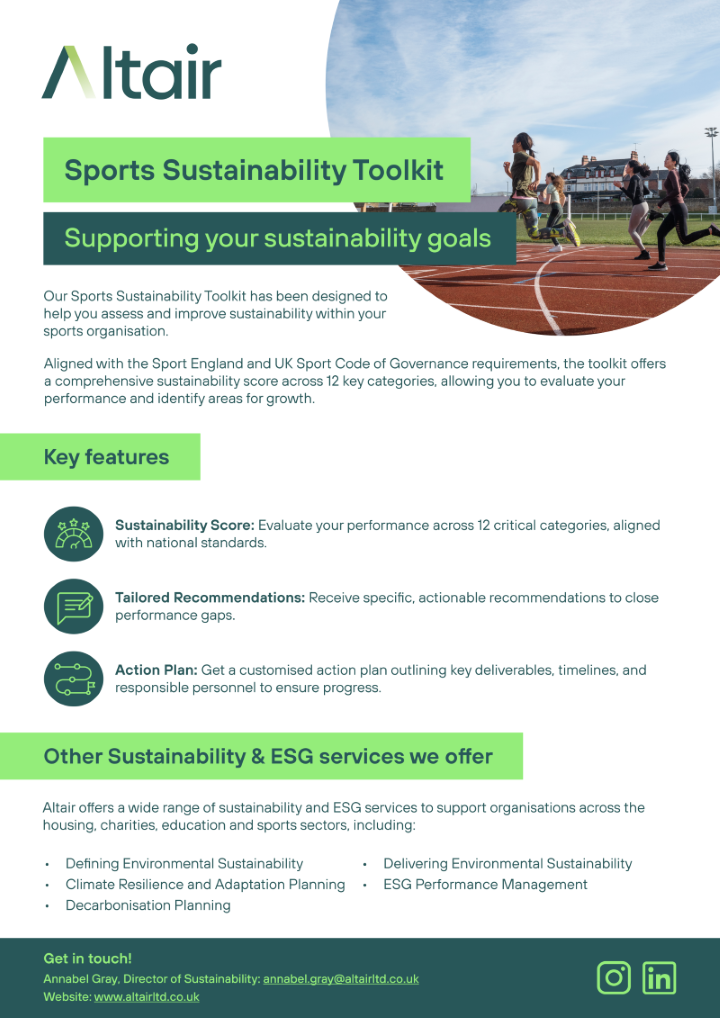 In 2025, ConnectSport will continue to showcase the contribution of sport to sustainable development and ESG (environmental, social, governance) priorities. In the second part of this two-part article, Active Humber CEO David Gent, who is Chair of Active Partnerships’ Climate Crew, and Annie Gray, Director of Sustainability for Altair Ltd, talk about their priorities for the year ahead. Read part one of the article.
In 2025, ConnectSport will continue to showcase the contribution of sport to sustainable development and ESG (environmental, social, governance) priorities. In the second part of this two-part article, Active Humber CEO David Gent, who is Chair of Active Partnerships’ Climate Crew, and Annie Gray, Director of Sustainability for Altair Ltd, talk about their priorities for the year ahead. Read part one of the article.
ConnectSport: Hi both, why is it important that real and sustained positive action happens at community level, especially when it comes to achieving population-wide behavioural change and contributing to globally-agreed targets?
Annie: I read a report recently which stated that a third of the problem (with the climate crisis) is around behaviour change. We know technology and innovation can also help in the future but for those smaller organisations or community groups that perhaps think they don’t have much of a contribution to make – certainly in comparison to the larger organisations – I would say ‘every little does help’. At the same time, we also need guidance and leadership from the top, to inspire and gain the momentum which is required. Another motivator for driving change is organisational resilience. We are seeing more and more sports events impacted by issues related to climate change, and so if we want that organisation or community group to survive, we have got to start thinking about how we build resilience into the sector. Whether that’s soft landscaping to help reduce exposure to flood risks, or how can we ensure organisations are not hit by increased costs for insurance, or disruption to their sporting events. Ultimately a lot of it circles back to cost, and we know those who are hit hardest are the most vulnerable. So it’s about working together to build in resilience so that organisations are future-proofed. As an example, my local golf club had flood damage during the summer and a large percentage of their bunkers were ruined. The insurance won’t cover it any more because it’s the second time it’s happened, so membership fees are going up. Of course this is just one of many examples but for anyone who has been sceptical, my point is that it’s happening where we live right now.
David: It’s about thinking what we can gain from climate action, in practical and tangible terms. For example, Birmingham County FA recently worked out that 50% of all the playing pitches that kids were playing on in the city were below the acceptable standard for air quality. The biggest contribution to the lack of clean air was car emissions, and they realised they had a competition structure in place which saw people travelling to and from games by car across the city – so they started to think about what positive changes they could make. Behaviour change comes at individual level and we shouldn’t underestimate how, if we all say ‘we’re not doing that at population level’ then the market responds. The market forces us to do things, but we can choose where our money gets invested, for example clubs saying ‘we don’t need a new kit every year’. This is about making it real in people’s lives, so they can cope with it. If 30 of us in one club do it, that’s a great start and a big impact!
What are your ESG (environmental, social, governance) priorities for 2025, at Active Partnerships and at Altair?
David: Across the Active Partnerships network, we have recently agreed our new commitment towards sustainability. It’s not a strategy, it’s a commitment to work with others to make their strategies a reality. We have got more than enough strategies already, we just need to get on with doing stuff – at pace and at volume. We will work at national, regional and local levels using the power of sport and physical activity to bring things forward; it’s about lots of little actions and all coming together in a co-ordinated way.
We will also continue to influence the national agencies to best explain what the problem is in a sporting context, which often gets missed at first glance. We also need to look at consumption across sport; we still eat a lot of poor food, we still like new kit, and I’m not sure we’re using the best heating equipment. If we’re absolutely committed to addressing inequalities and including people then those are three things in a cost-of-living crisis which prevent people from playing sport because they can’t afford to pay for the food, or the kit, and they are going to prioritise heating their own home. As sports clubs and physical activity providers, we need to think about encouraging those who more often than not haven’t got the cash to be involved.

Annie: What I am seeing across different sectors is that we don’t quite integrate those principles of a circular economy, and we could and should be doing much more. It can be very easy to develop ‘carbon tunnel vision’ where organisations focus just on carbon and don’t see the interconnection between all of the topics. In business transformation, if you take a whole-system approach and look across the E, S and G then you are going to tap into all of the benefits - sometimes without even realising you are doing it. One example is if you have an events space and you increase the soft landscaping, this will reduce the chances of flooding but will also increase biodiversity, which will increase mental health and wellbeing because it’s nicer to be around a softer, green environment, and with that you improve air quality and reduce carbon emissions. There’s this domino effect with one action which automatically leads to the rest of these benefits.
As we move into 2025, at Altair we are keen to support and encourage our client organisations to take that whole-system approach. We will help them identify what measures need to be taken, and ensure that it’s not just one person left holding the strategy. There are many ways of doing this, for example if it’s a larger or corporate organisation could they build objectives into people’s appraisals so they are accountable or responsible for the area they can influence? But even if an organisation hasn’t got a strategy, then we will help them to develop it, and make sure it’s achievable and proportionate to the impact they are having. Then if they have got a strategy, we will help them to implement it efficiently and communicate it effectively. Either way, we want to celebrate the successes, we don’t shout enough about the good stuff that is already being done.
What will be your key message for 2025?
David: For me, we must listen to and involve children and young people, because they are going to live their entire lives in a climate emergency. At the same time of course we must also listen to older people, because in the past they built cricket pitches without chemicals and still kept the weeds away! Across all generations and backgrounds, we have got to have more disparate voices actively involved – especially those facing the greatest inequalities who will be impacted most by climate change – so let’s make sure we are widening the debate. We need to share lots more experiences and opinions so everyone feels involved in the conversation.
Annie: I agree, everyone has a role to play. As I mentioned previously, we know that behaviour change is at least one third of the challenge before us, so we have got to ensure that everyone is meaningfully engaged in this topic. If you search for any definition of sustainability then it usually talks about protecting future generations and building resilience, so it’s vital everyone is involved and can have an influence. We know from Altair’s work in sustainability across the housing sector, that some of the best engagement happens when working with young people who go home and tell their parents about the cool projects they have been working on – so let’s get everyone engaged and involved in the discussion!
Our thanks to Annie and David for speaking to ConnectSport. Read part one of this article here.
Read about Active Partnerships' new Environmental Sustainability Commitment.
To find out more about how Altair Ltd can support your organisation, access the Sports Sustainability Toolkit and complete the Expression of Interest form or email emma.atkins@altairltd.co.uk











